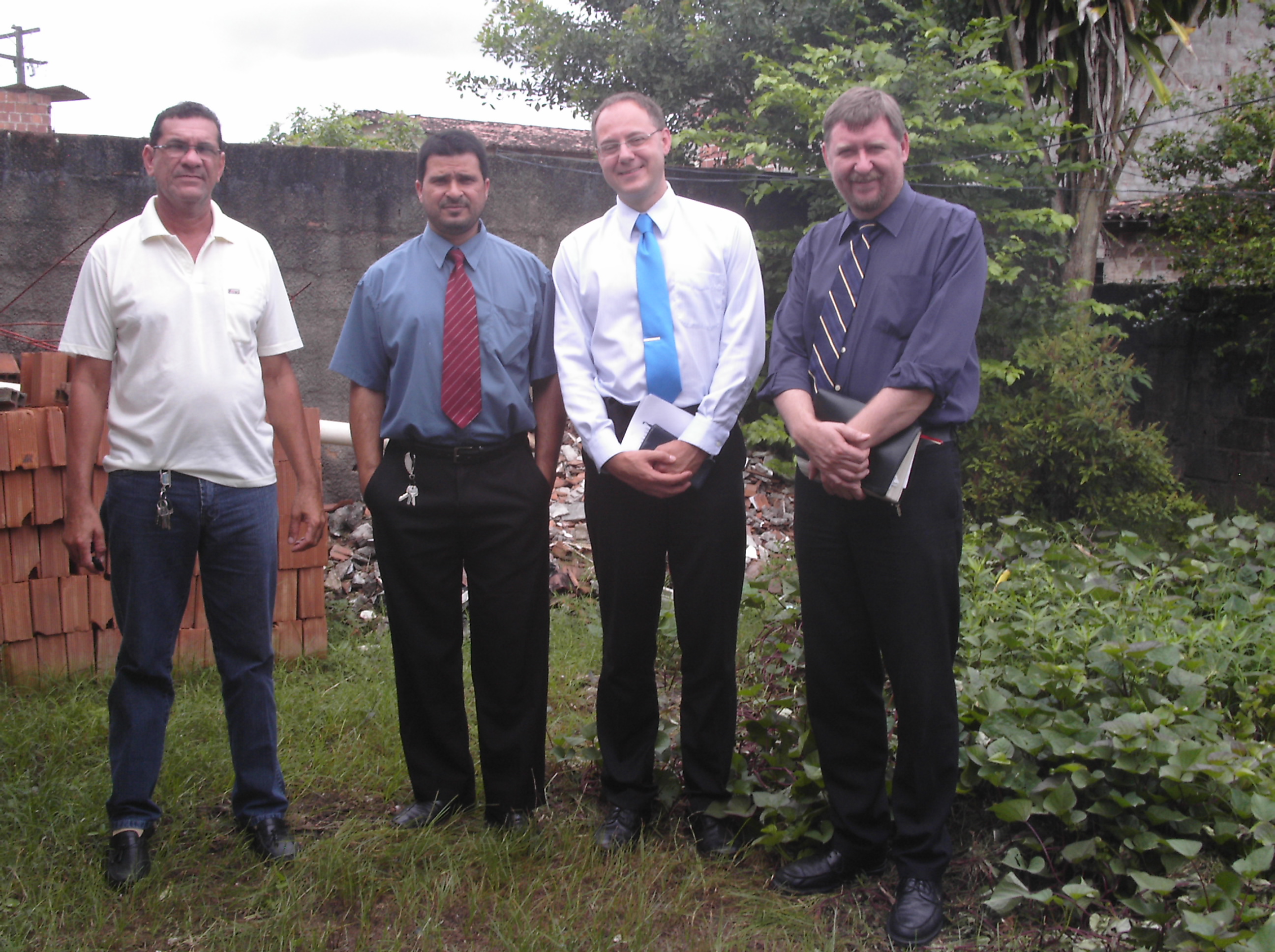The Gospel Under the Southern Cross (2)


With the office bearers in Vera Cruz.
So I arrived safely in Brazil on Saturday afternoon, as planned. The flight(s) down had some hiccups. A huge thunderstorm blew through Newark on Friday night and my flight for Sao Paulo ended up leaving two hours later. But there was still plenty of time to make my connection for the flight to Recife. One thing that impressed me during the flights over here is the size of Brazil. The flight from Sao Paulo to Recife took three hours. That’s about the distance from Hamilton to Saskatoon. Brazil is HUGE.
Yesterday I had the opportunity to preach at a couple of the local Reformed congregations in the Recife area. In the morning I was at the congregation nearest the seminary, Vera Cruz. In the evening, we went across town to the congregation in Dois Unidos. Let me share my impressions of my experiences worshipping with the brothers and sisters here.
The worship services in these congregations were simple, reverent, and Reformed. The language was Portuguese, but the structure and elements of the worship services would be familiar to any Canadian Reformed believer. This was the order of worship in the morning:
Call to Worship
Votum (Psalm 124:8 recited by the congregation)
Salutation
Responsive Song
The Law of God
Responsive Song (Psalm 130)
Prayer
Reading of Scripture
Singing
Sermon
Prayer of Application
Responsive Song
Offertory (during which Psalm 117 was sung)
Congregational Prayer
Song
Benediction (followed by three-fold Amen in song)
As you can readily see, there’s nothing out of the ordinary here. Most of the singing involved psalms set to Genevan tunes (yes, Brazilians can sing Genevan tunes too – and very well!), and there was no musical accompaniment.
All this has confirmed what I’ve written in my book, For the Cause of the Son of God:
Missionary liturgics (ethnoliturgics) is another area which remains undeveloped in Reformed missiology. The Belgic Confession draws this to our attention by saying that “the whole manner of worship which God requires of us is written in it at length.” This is a brief statement of the regulative principle of worship which appears again later in the Confession (article 32) and also in the other Reformed confessions. The regulative principle states that we may not worship God in any other way than he has commanded in his Word – that means the Word is not only sufficient for our salvation, but also for our worship. In its maintenance of this principle, the Belgic Confession also speaks to the question of the shape and character of worship on the mission field. When the gospel comes into another culture and God gathers his people from that culture, what should their worship look like? Should it look like the worship of the missionaries? Or should it take on the pre-Christian worship of the receptor culture in any way, shape, or form? These are difficult questions to answer and the Belgic Confession provides an answer with its statement of the regulative principle.
The Confession states that God’s Word lays out the “whole manner of worship.” Context is necessary for interpretation. In the Reformed churches, a classical distinction exists between the elements and circumstances of worship. Elements are the divinely ordained parts of the worship service such as preaching, prayer, and singing. Elements are supracultural and, in principle, should be the same from culture to culture. A Reformed church in Brazil should have the same elements as a Reformed church in the Congo or in Canada. Circumstances are culturally determined and can vary from church to church, even within a given culture. Circumstances include things such as the architecture of a building, the furniture within, the times of the worship services, the music used to accompany the singing and so on. Circumstances are determined with wisdom informed by Scripture, and there is considerable freedom in this area. Recognizing this distinction helps to answer many questions in missionary liturgics.
Not only are the elements the same in Brazil as in Canada, but also the structure. Why? Because the covenant of grace is the same — it transcends cultures. Biblical worship is always about a covenantal dialogue between God and his people. If that dialogue is not there, it’s simply not biblical worship.
The evening service at Dois Unidos was much the same as the morning service at Vera Cruz, except that it was along the lines of our afternoon service.
I loved being able to worship with my Brazilian brothers and sisters. These are small congregations – I don’t think there were more than 30 people at either place. But they are holding out the gospel witness to the communities in which they’ve been placed by our Father’s providential hand. He is using them to draw more out of the darkness and into his light and it’s a beautiful thing to see.



